 The
The
fourth Harry Potter movie – Harry Potter and the Goblet of Fire – is
less than a month away and, as with all things Hogwarts related,
speculation is rife as to how this latest chapter will move the story
forwards and how faitful it will be to the best-selling book.
I
was lucky enough to catch one of the very first press screenings of the
completed movie and while reviews are strictly under wraps until the
day of release I will say this much: it’s great. Really great. Leaner,
darker and funnier than the previous entries, it’s easily the best
Harry Potter film yet. Certainly one of my favorite movies of the year.
With
that in mind, I sat down with various members of the press to quiz the
cast (coming soon!) and director Mike Newell (Four Weddings and a
Funeral, Donnie Brasco) and producer David Heyman, the man who has
guided the Potter franchise through the studio maze and brought it to
the screen with its integrity intact.
Both
men are the very image of self-deprecating Englishmen, with a shared
dry sense of humor, and both clearly care deeply about Harry Potter,
his fans and his cinematic future. Read on, and you’ll see why the film
is so damn good.
How is this Harry Potter movie different from the others?
Mike
Newell: For me, I think because of the age of the people, the age is
crucial, what’s been happening is that the scale of the challenge to
the leading character has been limited. He’s had a basilisk to deal
with, he’s had this problem and that problem, but he’s never actually
been challenged in his self. He’s never had to put up or shut up, he’s
always had the group to rely on. Now in this one, he’s older, he’s more
conscious and he knows more of what’s happening to him.
SPOILER…So
when Voldemort says in the graveyard, come out here – do you want to
get it in the back or in the front? You’re going to get it, whichever
way. And what Harry says is, alright, I’ll show you. And he comes out,
and he’s ready for a fight. And he knows it’s a fight to the death, and
he has the moral courage to do it…END SPOILER
And
of course there are lots and lots of wonderful new things – the jokes,
the growing up, the girls and the "Oh God, how do we dance?" and all of
those things, but the big difference is that the challenge is a moral
one – and he may not survive it.
David
Heyman: When we went and spoke to Jo (Rowling) for the first time, it
was a very important thing for her. I think it’s a theme that will
continue, to stand up and be counted even if you might not win.
MN:
David took me up there, two years ago now, and she talked about just
that. These moral challenges. And she was brilliant about it, and I
took a great deal away from that.
DH:
In other changes, it is a thriller. The world has expanded, we’ve got
two new schools coming in, we have the first contact with the opposite
sex and the good, the bad and the uncomfortable sides of that, that
begin at 13 or 14 and never go away. But at the heart, as Mike says,
Harry is now 14, he’s much more of an individual than he’s ever been
before. He’s becoming who he is, who Dumbledore is grooming him to be.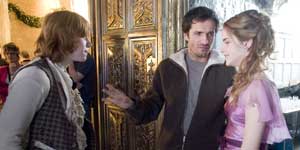 MN:
MN:
It’s terribly interesting that both you and I are taking Emma (Watson)
as a sort of honorary boy, but Emma now gets to be a young woman which
is something that I personally am very proud of. She allowed herself to
be very vulnerable. She could quite easily have said "Well, I’m
Hermione and I’m going to be this and that" but she was very allowing
of a vulnerability, and not knowing, and not being kind of cool. I was
very pleased by that. Just as in number 3, there’s this hugely
satisfying moment where she hits Malfoy, so there is in this one,
there’s this wonderful moment where she’s unsure and insecure.
DH:
I think the kids, frankly, are growing as actors and Mike is
benefitting from them having two films with Chris (Columbus) and one
film with Alfonso (Cuaron), but at the same time one of the many
reasons we brought Mike in is that he’s one of the great directors of
actors, and the kids are challenged. He didn’t let them rest one minute
on what felt comfortable. He pushed and pushed and pushed, and I think
the performances show it.
You’ve got some of the greatest actors in England as the co-stars, and they’re just background now to Harry’s story…
MN:
It’s a problem. It is a problem. I think that the way that we attacked
it was that even though each of them now – Maggie’s established, Alan’s
established, Mike Gambon, Hagrid – all these people are established so
there’s no more exploration for the audience to do of those characters.
Indeed they mustn’t change, in a way. So what you have to do is find a
kind of lapidary way of using these tiny little bits that will show you
parts of these characters that we’ve never seen before. You’ve never
seen Hagrid in love before – and a very wonderful thing it is too…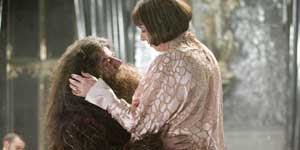 She
She
did this thing at rehearsal, nobody could believe it – this is Frances
De La Tour. They found themselves opposite each other – of course both
of them are great natural comedians – so it was wonderful seeing these
two people being awkward and blushing and retiring with each other.
Then suddenly she leaned forward and does what she does in the scene,
in the movie. She picks something out of his beard, and we all thought
"Oh, isn’t that wonderful!" and then – God help us – she ate it. Those
little things, a tiny moment like that will keep those characters
alive. But yes, it’s difficult.
DH:
Also look at how Dumbledore in particular has changed. This is the
first time that we’re aware that things are getting beyond his control,
and he’s not particularly comfortable with it.
MN:
Yes, that’s very interesting actually. Michael (Gambon) was very game.
I think that he had not wanted to be the same figure that Richard
Harris had been, a figure of enormous Olympian authority who’s never
caught on the hop. He wanted something to do, simply because he isn’t
Richard Harris, and what he found in this one is that Dumbledore is
fallible, not omnipotent, and indeed is behind the game. A great deal
of what he does is about being inadequate rather than super-adequate,
which is obviously much more interesting to play.
Mike, how much awareness did you have of the movies and the books before being approached?
MN:
I’d seen both the films, I’d read the first book before I was
approached so…I was hoping to be approached, and was therefore
educated, pretty reasonably, when I was approached. Then of course I
began to watch the films obsessively, and I can still in my sleep do
close textual analysis of numbers one, two and three.
DH: Alfonso was very generous actually.
MN: Yes he was. As I’m sure Chris would have been.
DH:
As Mike has been in turn with David Yates (director of the fifth
movie). Alfonso engaged Mike in discussion about the process and the
digital effects, allowed him to see the film (Prisoner of Azkaban)
early. Just as Mike did with David Yates. David has seen a rough cut of
this film. It’s been great.
By
the way, Mike was maybe the very first person I approached for the
first Harry Potter, so I wanted him from the very beginning.
MN: What a fool!
Do you think that this isn’t a kids movie any more?
MN:
It isn’t for me. It’s an adventure story. It’s a huge
entertainment…Warner Bros absolutely hate me saying this, so I’m
going to say it…for me it had all the variety that a Bollywood movie
has. Ooh, no! He said it! But at any rate, it’s a huge broad-based
entertainment. But above everything else, David is habitually very
modest about this stuff, but he was very good when he first approached
me. What he said was "You must read the book and if you find a way of
doing the book then you must tell us what that is. You mustn’t come
because it’s a franchise, you mustn’t come because it’s the biggest
children’s film there’s ever been, you mustn’t come for this, that and
the other – you’ve got to be able to see how to make a 750 page book
into a single movie."
We
then had one of the meetings made in heaven, where we talked about the
thing as being a thriller – because that’s what I found in it. I
thought it was an absolutely God-given thriller, and then I convinced
him.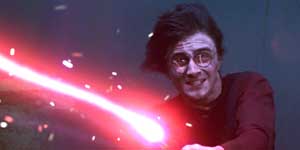 DH:
DH:
For me the books are not children’s books. I think that’s a
misconception. I think they are books that appeal to maybe children of
all ages, but I think they appeal to people of all ages. There is
something for everyone in them. Each of the books is more mature than
the one that preceded it because they’re dealing with a different age,
a different year in Harry’s life. In this one Harry’s 14 so there’s
different issues, greater complexity, I think that really shows in the
film. The film is true to that spirit.
When
you bring in a director like Mike Newell, when you bring in a director
like Alfonso Cuaron, they’re directors. They’re not cookie cutters. You
don’t bring in a director like Mike Newell and say you have to make a
movie just like Chris Columbus. Why would you do that? It would be
foolish. I look at this film, I see Jo Rowling but I see Mike Newell
written all over it and that’s really exciting to me. I saw that with
Alfonso, and with Chris too. I’m sure that David Yates will imbue the
fifth with the same. It’s really exciting for me. This is a big,
generous, smart, funny thriller.
Are you happy with the PG-13 rating?
DH:
Very much so. And I’m happy with the 12A rating in the UK. It shows
that we’ve been faithful to the material. The books do not talk down to
an audience, the audience reaches for the books and I think the films
do the same. We do not patronise our audience. Mike’s made a film
that’s very much in the spirit – it’s not literally faithful – but it
is truly faithful to the spirit of what Jo has written.
MN:
One of the challenges was that everything goes back to the book,
always. And that’s where the audience begins as well, so as the
audience that began with the first book progresses through two and
three, they get to four and they see that it’s a different kind of an
animal. It’s a much tougher beast than the others. If you don’t get a
PG-13, that audience that is now 14, 15, 16 or 64 – whatever – will
want to know, are you not infantilising the material?
Of
course what David says is that these are not children’s books. These
are adult stories with a very strong moral aim and view. With PG-13
they can believe. Without, I’m not sure they can.
Mike, in this stage in your career how does this rank personally – not just the film but the whole Potter project? MN:
MN:
OK, so…I always hate what I make. I think that it simply shows a
depth of…a lack of…I truly mean this, I know that it sounds like
jokes, but it isn’t. I can’t stand myself sometimes. He’s seen me in
rushes where I simply can’t bear the ordinariness of what I do…
DH: Even when it’s extraordinary…
MN:
But I really do. I always hate the end result, but this time – and it
may be a very bad sign, I don’t know – this time I don’t hate it. I
think it’s what I tried to do – what we all tried to do – which is to
make this wonderful, terrifying thriller ride. And so it pleases me
very much, and that’s a better way of answering your question than I
know how.
David, can you tell us what "Britishisms" Mike brought to the film?
DH: Absolutely. Mike went to a school – as did I – which was very much like Hogwarts but without the magic.
MN: Our two schools were very close, very similar.
DH:
So he brings an innate understanding of the school life. He is very
comfortable getting on the floor and wrestling with the kids – as he
did with the Weasley twins – to bring verisimilitude to that moment.
The school is more anarchic than I feel it’s been in any of the other
films. It’s a little madder and looser. Yes, you have the authority of
the teachers but you have the kids rebelling, as kids do. Kids standing
up for themselves, kids standing up to teachers. I think that’s very
true to the school I went to, and to schools in general, but I think
it’s particularly true of British schools.
MN: It’s true.
DH:
I also think that, in a way, the nature of the performances – it’s an
intangible thing that I don’t really know how to describe – the
performances in this are more British than they’ve even been. I feel
that there’s a complexity and at times – you talked about Bollywood – a
theatrical, a largeness in a really positive way to the performances.
By the way, I think Dan (Radcliffe) is incredibly subtle and nuanced,
and I think all the performances are, but there’s a boldness about them
that I think is very British, and I’m very happy for that.
Can you tell us a little about how the actors are coping with growing up on set and on screen in front of the whole world?
MN: I don’t know.
DH: How did you find them when they arrived?
MN:
My worst fear was that they would have realised that these were stories
in which they, absolutely, were the stars. Now most children’s stories,
that’s not true of. Most children’s stories they’re add-ons, a third of
the story, while the weight is still carried by the adults. In that
way, Mary Poppins is not quite a children’s story, it’s an adult’s
story. But that’s not the case here, this is a story in which the
children are stars. That can do terrible things to children and,
miraculously, mostly because of the way they’re handled by the
production – and also because they’ve got very good parents, a good kid
has good parents – they haven’t. They know exactly what they’re worth,
but they’ve not become impossible. They’re still loose, they’re still
curious and they’re still prepared to have a go at anything.
Before
we began shooting we had two weeks of acting classes and the reason I
did that was because I was very anxious that the established characters
would not dominate the newcomers, many of whom hadn’t acted before –
the Chinese girl hadn’t acted before, the two Indian girls hadn’t acted
before – and I didn’t want them feeling they were secondary citizens,
so we had these two weeks where we played, we did physical exercises,
we did improvisational exercises, and by the end of that everybody was
loose in one another’s company and there was no rank structure, Dan
never outshone anybody, and they were very happy to do that which is a
very wonderful thing. And it shows because now you have an ensemble
rather than a top-down pyramid structure.
DH:
I think in this film, more than the previous three, partly because of
the number of the cast and the number of extras – the number of extras
in this film was more than any of the previous films – more than any of
the other films there was a feeling of community among the kids. They
were playing and joking, there was a lot more hanging out, and Dan,
Rupert and Emma were all a part of that. It was a much more extended
community, much more like school life than I think it’s ever been.
MN:
That’s a good point actually, I hadn’t thought of that. It was much
more like the kind of loose relationships you would build up in school.
Much bigger.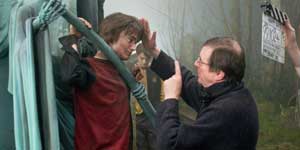 DH:
DH:
I have to say, we are blessed. The three kids who could so easily, as
Mike says, be brats are not. They want to learn, they want to get
better at what they do, they are enthusiastic still and they have a lot
of fun doing. Partly the rehearsal that Mike had them do, but also
their very nature, they are non-judgmental, open people who are good to
people from the top down. I think Mike will attest to this. Though the
buck always stops with him ultimately, it’s a very democratic
environment. It’s one in which everybody has a voice…sometimes too
much of one (laughter).
MN: I agree, I agree. Trouble is you can’t start to play that game unless you play that game all the way through!
DH: It’s very democratic. It’s a place in which everybody is welcome, a very open door, a very safe place for kids to be.
MN:
Can I very quickly tell them about the fight? There had to be a fight
at one point between the two Weasley twins and they did horrible
adolescent stage fighting. It was awful. I tried again, and I pushed
them, and they still couldn’t get past it. And I said "OK, which one of
you wants to fight me?" They were like rabbits in the headlights. Had I
said what they thought I’d said. One of them puts his hand up and we
fell upon one another and rolled over and over and over on the floor of
the Great Hall until I actually cracked a rib. And it was very early on
in the shooting schedule, all the kids were there, and they all saw the
director make a complete prat of himself, and also get himself injured
– ha ha ha. And things were a lot easier after that. It doesn’t do any
harm to puncture dignity.
How frequently did you consult with J.K. Rowling about deviations and subplots cut from the book?
MN:
Jo Rowling appears to me to be quite extraordinarily hands off.
Everybody says "Oh, we’re surprised to hear that, we thought she was
very controlling" but I speak as I find. She wasn’t with me, and I
don’t think it’s in her nature. She isn’t like that. However, David’s
relationship with her – which is very close – meant that the whole
time, the script as it evolved – you know, I had a set of script pages
five days ago, we finished shooting six months ago! – what happened was
the script did evolve in a very radical and dramatic fashion. It’s a
huge tribute to both David and to Steve Kloves that both of them – and
everyone around them – could be loose enough to see that we might be
going to a place that wasn’t exactly where the first draft of the
script had started out.
Of
course, the danger in that is that you lose Jo Rowling and at that
point you lose the audience, because they come – in the end – for her.
She was very very sweet, she was very available. She’s not the best
returner of a phone call that I’ve come across but she gave me very
clear things when I needed them, like what did the Abra Cadavra curse
actually do when it hit you? She also had this very strong view of how
the story fitted into this seven book arc. Beyond that she didn’t
control at all, but it was to David’s credit that she was brought into
the process just as much as he knew she wanted to be and not an inch
more. How does that work?
DH:
Jo is the most generous of collaborators. She sees each and every draft
of the screenplay. We want to do that. One, because I made a promise
right at the beginning that we would be true but two, because we would
be fools to do otherwise. We don’t want to do anything that would
disrupt the books, at that time six hadn’t been published, or book
seven. We didn’t want to do anything that would adversely affect that,
or that would make people look at them askance.
Also,
she has incredible knowledge. What’s in the books is just the surface
of what she knows. She has notebook upon notebook with more material
that doesn’t find its way into the books, but I think one of the
reasons for the success of the books is that the universe is so clearly
thought through. She knows the six uses of dragon’s blood. You can have
a question, she knows the answer. There was one, for example, very
significant change that we made and we called Jo to ask her about it
because it was major.
SPOILER…It
had to do with Barty Crouch Jr being present in that very first scene
in the film, with Voldemort and Peter Pettigrew. The scene takes place,
but Barty Crouch Jr isn’t in it. The reason why we wanted that was
because we needed Barty Crouch Jr to be a more recognisable and
formidable presence when you got to the end, when Moody turns back into
him. Without that, the only time you’d have seen him would be in the
flashback when he didn’t look exactly like he did at the end. I called
Jo and asked her that and she said "Yeah, that could’ve happened.
That’s absolutely fine."…END SPOILER
What
she loved about the third film was that it was true to the spirit. It
made changes but it made them in the spirit of the work. That’s what
she has felt so far in the inclusive process of the script.
MN:
She has the attitude that the book is the book and the film is the
film, and you won’t make a good film unless you have a certain amount
of freedom.
How did Dan Radcliffe cope with the increased physical demands of this movie?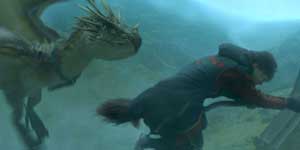 MN:
MN:
He’s a brave boy, he really is a brave boy. He’s a rotten swimmer – or
he was when this began – and he had great trepidation and came to me
about the swimming. There was no way around it, he had to swim and
spend huge amounts of time underwater in the tank. Apart from anything
else, he was by no means sure that he had the physical resources to do
that. You couldn’t say he was frightened of it, but he was only a step
away. Nonetheless he knuckled down and he did what he had to do. There
was a shot, that I was there for, where I could see he was absolutely
terrified but he had to do it – sliding down the roof. I think it may
be in the trailers. There’s a shot anyway when, during the dragon chase
where he’s knocked off his broom and slides down a very steep roof,
which he did for real. He slid thirty feet down a forty foot gantry,
with a safety wire on of course, but nobody had to say "Sorry Dan, but
you’ve got to do it" – we would ultimately, of course, have said that!
– because he will read himself the riot act, he will tell himself what
he’s got to do. He’s not going to turn into a stuntman but he’s a very
responsible boy, he knows what he must do, and he does it.
DH:
On the first film, when we began the process, Dan was not a physical
boy. He wants to be more physical and we encouraged that. We put him
together with our stunt team and he is now a jock, of sorts. At lunch
break, for instance, several times a week he’ll go down to the gym and
work out. It’s not something we’re actually asking him to do, he just
loves to do it. He’s very brave, as Mike says. In the underwater scene,
he logged 41 hours in his logbook.
What can you tell us about the importance of Steve Kloves’ role in the Harry Potter process?
DH:
One of the great joys of this entire series has been working with Steve
Kloves and, frankly, he’s becoming a very good friend over the five
years. I think he’s one of the best writers writing, he’s a brilliant
adapter in the sense that he’s able to retain the voice of the author
he’s adapting. He did it with Michael Chabon with Wonder Boys, and I
think he’s done it with the four Potter films he’s written. He is a
fantastic writer who has a keen sense of character, and really
understands the voice of the actors he is writing for. He’s able to
write with great emotion and also great humor.
He’s
not doing the fifth because he is writing another project for me, which
is The Curious Incident of the Dog in the Night-Time, which I hope he
will direct. However, he read the sixth book and couldn’t stay away so
he’s going to come back and write the sixth.
MN: Oh, great! That is good!
DH:
Yeah, I know. It’s great. Michael Goldenberg is writing the fifth. He’s
another writer I talked to about the first film and he’s doing a
fantastic job. You can never make a good film out of a bad script, but
you can certainly make a bad film out of a good one. The key is to have
a good script, and I believe that on each of the four films Steve
Kloves has given us a really good script. He’s also a man, and Mike can
speak about this a little bit, who writes without ego. It’s great when
you sit in a script meeting with him, because you can talk it through
and he’s thought through everything. It doesn’t mean he doesn’t defend
what he has, but he does it in a way which explains why he has done
what he’s done, but it’s always open to changes. He also has an
encyclopedic knowledge of the world and clearly he and Jo are on the
same wavelength.
MN:
It was the happiest collaboration I’ve ever had – certainly as an
adapter. He never gets in your way. I am one of those who will want
stuff to be written, and re-written, and re-re-written all the way
through the film – which is why we joked about getting pages six months
after shooting – he would never complain about that, he would always
see why and he would dig down into his personal mine of stuff and come
up with wonderful things. I can’t tell you how happy I was with him.